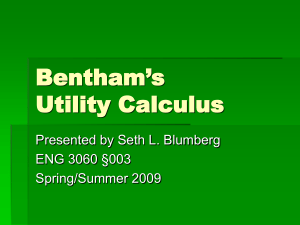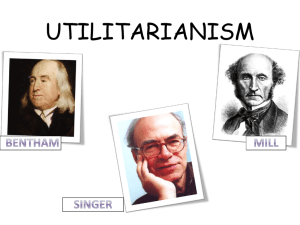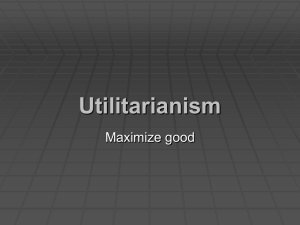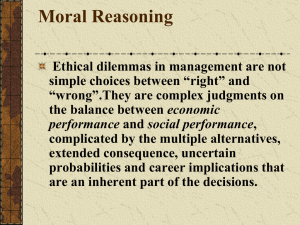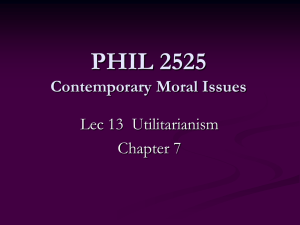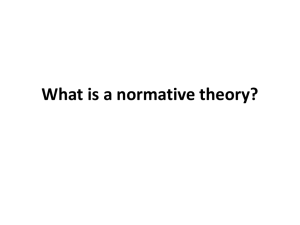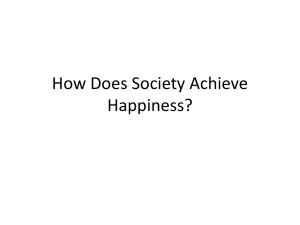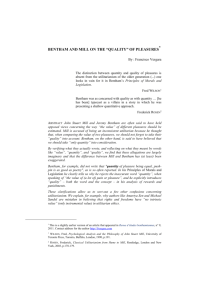ut - St Vincent College
advertisement
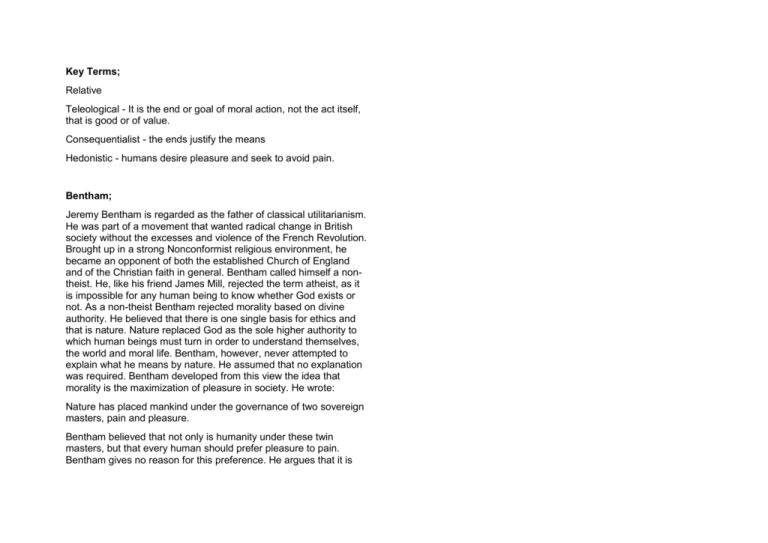
Key Terms; Relative Teleological - It is the end or goal of moral action, not the act itself, that is good or of value. Consequentialist - the ends justify the means Hedonistic - humans desire pleasure and seek to avoid pain. Bentham; Jeremy Bentham is regarded as the father of classical utilitarianism. He was part of a movement that wanted radical change in British society without the excesses and violence of the French Revolution. Brought up in a strong Nonconformist religious environment, he became an opponent of both the established Church of England and of the Christian faith in general. Bentham called himself a nontheist. He, like his friend James Mill, rejected the term atheist, as it is impossible for any human being to know whether God exists or not. As a non-theist Bentham rejected morality based on divine authority. He believed that there is one single basis for ethics and that is nature. Nature replaced God as the sole higher authority to which human beings must turn in order to understand themselves, the world and moral life. Bentham, however, never attempted to explain what he means by nature. He assumed that no explanation was required. Bentham developed from this view the idea that morality is the maximization of pleasure in society. He wrote: Nature has placed mankind under the governance of two sovereign masters, pain and pleasure. Bentham believed that not only is humanity under these twin masters, but that every human should prefer pleasure to pain. Bentham gives no reason for this preference. He argues that it is fundamental and needs no evidence. However, he does explain that pleasure and pain are not just physical sensations; they are also the psychological state that comes from feeling pain or pleasure. It might be argued that some people prefer pain, whether physical or psychological. The answer to this is that such people do not see pain as pain but rather as pleasure. Bentham follows-up his view that human beings are under the mastery of pain and pleasure by arguing that what is good for the individual, is right for human society and for all sentient (thinking being; able to perceive and feel things) creatures. Three points should be noted: 1. The principle of utility (the greatest good for the greatest number) has a universal application. Actions should therefore be calculated on the basis of what is good for the world and not what maximizes the happiness of a particular locality or class. 2. Every human being counts and all are equal. This is an egalitarian (belief that all human beings are equal and deserve equal rights and opportunities.) message - Remember Bentham lived in a society where only the rich got good medical care, education etc 3. Sentient animals are equally under the same law of pain and pleasure and have to be taken into account when actions to maximize pleasure are examined. Bentham's Calculus Bentham's utilitarianism was knows as Act Utilitarianism - Looks at the consequences of each individual act and calculates utility each time the act is performed. It is quantitative in its nature (this makes any calculation easier as all pleasure has the same value) He created his Hedonic Calculus' which gives 7 criteria to help determine the amount of pleasure an action would create. This can be remembered using the anagram DR PRICE - + Brief Duration Lasting Lone Pleasure Richness Brings many joys Accompanied Purity Painless Distant Remoteness Immediate Mild Intensity Intense Unlikely Certainty Probable Affects just Extent by pain one person Affects lots of people Bentham's calculus is used to choose between two courses of action. For each possibility you add up all of the pleasure/pain and then do whichever action leads to the most pleasure/least pain. Bentham thought it was important to reduce pain first and then look at pleasure. Once a calculation has been done a number of times for similar situations you can develop a 'rule of thumb' to avoid repeating the calculus unnecessarily. Mill - Background Mill was raised by his father, James Mill, to be a strict utilitarian. Jeremy Bentham also aided in Mill's upbringing, and Mill was deeply influenced by Bentham's writings. Mill's childhood was rigid and intellectual, and when, at twenty-one he began to question some of his beliefs, he suffered a nervous breakdown. Mill later struggled with his sense that utilitarianism was too unemotional and that it failed to capture or understand the "higher" pleasures. Thus, Mill's writings should be understood as the product of a struggle to reconcile Utilitarianism with complexities that Bentham's theory failed to acknowledge. However, Mill never rejected utilitarianism as a moral theory, and he continued to use Bentham's framework of pleasure fulfilment throughout his own writings. Mill highlighted the main problems with Bentham's Hedonic Calculus. He disagreed with its quantitative measure and its predictive value. Mill was also concerned with what counted as pleasure. Mills theory was one of Rule Utilitarianism which states we should act in accordance with rules which, if generally followed, would provide the greatest general balance of pleasure over pain. This helps with the protection of individual rights in a way Bentham does not - e.g. if everyone went around torturing everyone then the greatest happiness would not be served so rule - do not torture. Mills Harm Principle Mill was very concerned with the minority and how they could be protected. His harm principle states that the only reason to interfere with someone's freedom is if they are harming someone else. There are certain general rules that must be established in order to benefit the whole of society. Mills Higher and Lower Pleasures Mill believed quality was more important than quantity when it came to pleasure. The pleasures of the mind are far superior to the gratification of the body's desires. For Mill it is the higher pleasures that separates us from animals - 'better to be a human being dissatisfied than a pig satisfied'. He gave the idea of a competent judge to lend support to this argument. saying that if we where to ask a competent judge who had experienced both types in full they would tell us to pursue the intellectual pleasures as they are of better quality. Higher Pleasures - intellectual, cultural, spiritual ones e.g. going to the theatre, reading a highbrow book, education Lower Pleasures - bodily/physical ones - alcohol, smoking Food, Drink and sleep in the measures required to survive are necessary. It is when done in excess they become lower pleasures Preference Utilitarianism This form of Utilitarianism is most commonly associated with Australian philosopher, Peter Singer. His modern take on the greatest happiness principle focuses on the impact an action will have on the preferences of those directly affected. In achieving the greatest happiness, Singer argues that we should act in a way that satisfies people´s preferences—in other words, what people prefer or would most like to happen. Like Utilitarian's before him, Singer emphasises that peoples’ preferences count equally—my preference for something is no more important simply because it is my preference. This requires an impartial perspective is taken when considering the correct moral action. In identifying the right thing to do, we must consider all those affected by an action and aim to act in accordance with the majority´s preferences. Singer’s preference utilitarianism is important in considering the practical ethical issues which arise with Voluntary Euthanasia and Vivisection. If doing the right thing is acting in accordance with the individual´s preference then keeping someone alive when they would prefer to die is clearly wrong. In considering the treatment of animals, according to Singer, it is speciesist to assume humans are valuable simply because they are human. Singer proposes that the moral status of “personhood” should be extended to some nonhuman animals given their levels of intelligence and that consequently it can safely be assumed that they have a preference to not be harmed. Conversely, those humans who do not possess sufficient levels of self awareness or intelligence should not automatically qualify for equal moral status. Preference Utilitarianism, like other forms of Utilitarianism is still consequentialist and relative. It looks to achieve an outcome that satisfies the preferences of those directly affected and therefore the right action will depend on the circumstances and the preferences of those involved.

